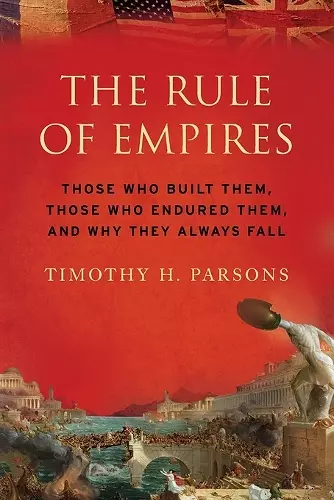The Rule of Empires
Those Who Built Them, Those Who Endured Them, and Why They Always Fall
Format:Paperback
Publisher:Oxford University Press Inc
Published:8th Nov '12
Currently unavailable, and unfortunately no date known when it will be back
This paperback is available in another edition too:
- Hardback£24.49(9780195304312)

In The Rule of Empires, Timothy Parsons gives a sweeping account of the evolution of empire from its origins in ancient Rome to its most recent twentieth-century embodiment. He explains what constitutes an empire and offers suggestions about what empires of the past can tell us about our own historical moment. Using imperial examples that stretch from ancient Rome to Britain's "new" imperialism in Kenya to the Third Reich, Parsons considers the features common to all empires, their evolutions and self-justifying myths, and the reasons for their inevitable decline. Parsons argues that far from confirming a Darwinian hierarchy of advanced and primitive societies, conquests were simply the products of a temporary advantage in military technology, wealth, and political will. Beneath the self-justifying rhetoric of benevolent paternalism and cultural superiority lay economic exploitation and the desire for power. Yet imperial ambitions still appear viable in the twenty-first century, Parsons shows, because their defenders and detractors alike employ abstract and romanticized perspectives that fail to grasp the historical reality of subjugation. Writing from the perspective of the common subject rather than that of the imperial conquerors, Parsons offers a historically grounded cautionary tale rich with accounts of subjugated peoples throwing off the yoke of empire time and time again. In providing an accurate picture of what it is like to live as a subject, The Rule of Empires lays bare the rationalizations of imperial conquerors and their apologists and exposes the true limits of hard power.
"Wide ranging, richly detailed, lucidly written, this compelling history of empires stresses the subject peoples on whose back these polities were built and whose resistance often caused their collapse. With his shrewdly selected mix of case studies, Parsons provides us with an important and timely rejoinder against those who romanticize imperial rule." --Dane Kennedy, George Washington University "How refreshing to read a history of imperialism aimed at a broad audience that refuses to blur or soften the brutal effects and origins of empire.... Parsons offers a refreshing, engaging and cogently argued counterweight to the more usual neo-conservative reckoning of empire's alleged benefits." --Philippa Levine, H-Net "A lucid, cold-eyed analysis of the mechanics of imperial control. The result is a compelling critique of empires past and of their latter-day nostalgists." --Publishers Weekly "Parsons, an Africanist by training, samples instructive imperial experiences: Roman Britain, Muslim Spain, Spanish Peru, the East India Company in Italy, Napoleonic Italy, British Kenya, and Vichy France." --Charles S. Maie, Foreign Affairs "Parsons sets an ambitious agenda for his case study on empires and largely succeeds. Explicitly setting out to counter the neoimperialist historiography of the last decade, Parsons uses a series of historic imperial episodes to illustrate the limits of empire and explain why empires subsequently fall.... Students of empire, historical or otherwise, would be well advised to read this book.... Highly recommended." --Choice "Parsons deserves to be commended for tackling such a key question in imperial studies. He offers a thought-provoking interpretation of the dynamics of empire from ancient to modern manifestations. His questions touching the evolution of empires merit serious consideration by historians." --Jodie Mader, Thomas More College "Parsons aims, laudably, to correct the imbalances... apologists of empire have introduced in readers' minds." --Felipe Fernandez-Armesto, Times Literary Supplement "Vigorously written and intellectually engaging...there should be little dissent from the relevancy of its anti-imperialist imperative in the twenty-first century." --David Levering Lewis, The Journal of Modern History
ISBN: 9780199931156
Dimensions: 155mm x 234mm x 36mm
Weight: 658g
496 pages